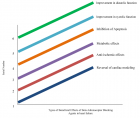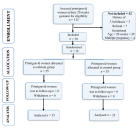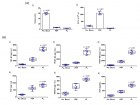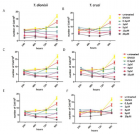Abstract
Review Article
Do beta adrenoceptor blocking agents provide the same degree of clinically convincing morbidity and mortality benefits in patients with chronic heart failure? A literature review
Martin Mumuni Danaah Malick*
Published: 04 November, 2019 | Volume 4 - Issue 3 | Pages: 182-186
Chronic heart failure has been extensively characterized as a disorder arising from a complex interaction between impaired ventricular performance and neurohormonal activation. Since beta adrenoceptor blocking agents are currently considered an integral component of therapy for the management of patients with severe chronic heart failure; several well designed clinical trials have been conducted to determine the morbidity and mortality benefits of these agents these studies, however did not yield the same results in terms of morbidity and mortality benefits. Currently only Bisoprolol, Carvedilol and sustained release metoprolol succinate have clinically proven and convincing morbidity and mortality benefits the current list of approved medicines of the National Health Insurance Scheme (NHIS) of the republic of Ghana does not provide coverage for these lifesaving therapeutic agents. The objective of this review was to collate the relevant scientific evidence that will convince the authorities at the National Health Insurance Authority (NHIA) of the Republic of Ghana to include at least one of the evidence based beta adrenoceptor blocking agents in the list of approved medicines.
A thorough search on the internet was conducted using Google scholar to obtain only the clinically relevant studies associated with the benefits of beta adrenoceptor blocking agents in patients with chronic heart failure published in the English language. The phrases beta adrenoceptor blocking agents and chronic heart failure were used as search engines.
The search engine yielded several studies that met the predefined inclusion criteria. However, only the Cardiac Insufficiency BIsoprolol Studies (CIBIS-I and CIBIS-II), Carvedilol Prospective Randomized Cumulative Survival Study (COPERNICUS) and Metoprolol CR/XL Randomized Intervention Trial (MERIF-HF) because of the clinical relevance of their findings Beta adrenoceptor blocking agents such as atenolol and propranolol have been used in the management of patients with chronic heart failure. However, their efficacy and optimal dose in reducing mortality have not been scientifically established not all beta adrenoceptor blocking agents scientifically studied provide the same degree of clinically meaningful and convincing morbidity and mortality benefits in patients with chronic heart failure.
Read Full Article HTML DOI: 10.29328/journal.jccm.1001063 Cite this Article Read Full Article PDF
Keywords:
Chronic heart failure; Evidence-based beta adrenoceptor blocking agents; Cardiovascular mortality
References
- Packer M. The neurohormonal hypothesis: A theory to explain the mechanism of disease progression in heart failure. J Am Coll Cardiol. 1992; 20: 248-254. PubMed: https://www.ncbi.nlm.nih.gov/pubmed/1351488
- Thomas JA, Marks BH. Plasma norepinephrine in congestive heart failure. Am J Cardiol. 1998; 41: 233-243. PubMed: https://www.ncbi.nlm.nih.gov/pubmed/203177
- Cohn JN, Levinen TB, Olivaris MT, Garberg V, Lura D, et al. Plasma norepinephrine as a guide to prognosis in patients with chronic heart failure. N Eng J Med. 1984; 311: 819-823. PubMed: https://www.ncbi.nlm.nih.gov/pubmed/6382011
- Avegim A, Tsuyuki RT, Porgue J, Yusuf S. Beta blocker therapy for chronic heart failure: A systematic review and critical appraisal of the published trials. Can J Cardiol. 1998; 14: 1045-1053.
- Bristow MR. Pathophysiologic and pharmacologic rationales for clinical management of chronic heart failure with beta blocking agents. Am J Cardiol. 1993; 71: 12-22. PubMed: https://www.ncbi.nlm.nih.gov/pubmed/8096671
- Doughty RN, Rodgers A, McMahon S. Effects of beta blocker therapy on mortality in patients with heart failure .A systematic review of randomized controlled trials. Eur Heart J. 1997; 18: 560-565. PubMed: https://www.ncbi.nlm.nih.gov/pubmed/9129883
- Packer M, Bristow MR, Cohn JN, Colucci WS, Fowler BM, et al. Effects of carvedilol on mortality and morbidity in patients with chronic heart failure. US Carvedilol in heart failure study group. N Eng J Med. 1996; 23: 1349-1355. PubMed: https://www.ncbi.nlm.nih.gov/pubmed/8614419
- Yancy CW. Clinical trials of beta blockers in heart failure: A Class review. Am J Med. 2001; 110: 7-10. PubMed: https://www.ncbi.nlm.nih.gov/pubmed/11259751
- Frishman WH, Cheng-Lai A, Narwaskas J. Current cardiovascular Drugs. Current Science Group. 2005; 52.
- Arcangelo VP, Peterson AM. Pharmacotherapeutics for advanced practice. A Practical Approach. Lippincott Williams and Wilkins. 2006; 205.
- Frishman WH, Cheng-Lai A, Narwaskas J. Current cardiovascular Drugs. Current Science Group. 2005; 153.
- Heidenrich PA, Lee TT, Massie BM. Effect of beta blockade on mortality and morbidity in patients with heart failure: A meta-analysis of randomized controlled trials. J Am Coll Cardiol. 1997; 30: 27-34. PubMed: https://www.ncbi.nlm.nih.gov/pubmed/9207617
- Packer M, Coats JS, Fowler MB, Katus HA, Krum H, et al. For Carvedilol Prospective Randomized Cumulative Survival Study Group: Effects of Carvedilol on survival in severe chronic heart failure. N Eng J Med. 2001; 344: 1651-1658. PubMed: https://www.ncbi.nlm.nih.gov/pubmed/11386263
- Cohn JN, Fowler MB, Bristow MR, Colucci WS, Gilbert EM, et al. Safety and efficacy of Carvedilol in severe heart failure The US Carvedilol heart failure study group. J Card Fail. 1997; 3: 173-179. PubMed: https://www.ncbi.nlm.nih.gov/pubmed/9330125
- Goldstein S, Fagerberg B, Almansten A, et al. For the MERIT-HF Study Group: Extended release in Metoprolol Controlled release Analysis of the experience in the MERIT-HFStudy. J Am Coll Cardiol. 2001; 38: 932-938. PubMed: https://www.ncbi.nlm.nih.gov/pubmed/11583861
- CIBIS-I Investigators and Committees. A randomized trial of beta blockade in heart failure: Cardiac Insufficiency Bisoprolol Study. Circulation. 1994; 90: 1765-1773.
- The Cardiac Insufficiency Bisoprolol Study II (CIBIS-II): a randomised trial. Lancet. 1999; 353: 9-13.
- Poole-Wilson PA, Svedberg K, Cleland JGF, et al. Comparison of Carvedilol and Metoprolol on clinical outcomes in patients with chronic heart failure in the Carvedilol or Metoprolol European Trial . Randomized Controlled Trial. Lancet. 2003; 362: 7-13. PubMed: https://www.ncbi.nlm.nih.gov/pubmed/12853193
- Fremantle N, Clevand J, Young P, Mason J, Harrison J. Beta blockade after myocardial infarction: Systematic review and metaanalysis. BMJ. 1999; 318: 1730-1737. PubMed: https://www.ncbi.nlm.nih.gov/pubmed/10381708
- James PA, Oparil S, Carter BL, Cushman WC, Dennison-Himmelfarb C, et al. 2014 evidence-based guideline for the management of high blood pressure in adults: report from the panel members appointed to the Eighth Joint National Committee (JNC 8). JAMA. 2014; 311: 507-520. PubMed: https://www.ncbi.nlm.nih.gov/pubmed/24352797
- Gruckshand JM, Pritchard BNC. Beta adrenoceptors In: Grusckshand JM, Pritchard BNC (ed). Beta blockers in Clinical Practice. London Churchill Livingstone; 1996: members appointed to the eighth Joint National Committee (JNC-8). JAMA. 311.
- Lowes BD, Gilbert EM, Abraham WT, Minobe WA, Larrabee P, et al. Myocardial gene expression in dilated cardiomyopathy treated with beta blocking agents. N Eng J Med. 2002; 346: 1357-1365. PubMed: https://www.ncbi.nlm.nih.gov/pubmed/11986409
- Ablad B, Carlsson E, Johnson G. Mode of action of beta blockers in Angina. Scott Med J. 1997; 22: 52-63. PubMed: https://www.ncbi.nlm.nih.gov/pubmed/13495
Figures:

Figure 1
Similar Articles
-
Do beta adrenoceptor blocking agents provide the same degree of clinically convincing morbidity and mortality benefits in patients with chronic heart failure? A literature reviewMartin Mumuni Danaah Malick*. Do beta adrenoceptor blocking agents provide the same degree of clinically convincing morbidity and mortality benefits in patients with chronic heart failure? A literature review. . 2019 doi: 10.29328/journal.jccm.1001063; 4: 182-186
-
Effect of hemodialysis session on acute changes in inflammatory and cardiovascular risk biomarkersBernardo-Alio Lavín Gómez*,María-Teresa García Unzueta,Armando-Raúl Guerra Ruiz,Sonia Pérez San-Martín,Ana Berja,Natalia Fañanás Rodríguez,Sara Díez Espejo,Domingo González-Lamuño Leguina. Effect of hemodialysis session on acute changes in inflammatory and cardiovascular risk biomarkers. . 2020 doi: 10.29328/journal.jccm.1001077; 5: 004-010
-
Prognosis of peripartum cardiomyopathy in sub-Saharan Africa (Burkina Faso South-West PPCM register)Taryètba André Arthur Seghda*,Théodore Boro,Jean Eudes Bambara,Kadari Cisse,Andrés Miguel Lopez,Patrice Zabsonre. Prognosis of peripartum cardiomyopathy in sub-Saharan Africa (Burkina Faso South-West PPCM register). . 2020 doi: 10.29328/journal.jccm.1001096; 5: 109-113
-
Security and performance of remote patient monitoring for chronic heart failure with Satelia® Cardio: First results from real-world usePatrick Jourdain*, F Picard, N Girerd, H Lemieux, F Barritault, MF Seronde, JP Labarre, N Pages, C Bedel, L Betito, S Nisse-Durgeat, B Diebold. Security and performance of remote patient monitoring for chronic heart failure with Satelia® Cardio: First results from real-world use. . 2023 doi: 10.29328/journal.jccm.1001152; 8: 042-050
Recently Viewed
-
Exophthalmos Revealing a Spheno Temporo Orbital MeningiomaHassina S*, Krichene MA, Hazil Z, Bekkar B, Hasnaoui I, Robbana L, Bardi S, Akkanour Y, Serghini L, Abdallah EL. Exophthalmos Revealing a Spheno Temporo Orbital Meningioma. Int J Clin Exp Ophthalmol. 2024: doi: 10.29328/journal.ijceo.1001055; 8: 001-003
-
Value of electrocardiographic T wave inversion in lead aVL in prediction of Mid Left Anterior Descending Stenosis in patients with stable Coronary Artery diseaseGehan Magdy*,Awad Yousef. Value of electrocardiographic T wave inversion in lead aVL in prediction of Mid Left Anterior Descending Stenosis in patients with stable Coronary Artery disease. J Cardiol Cardiovasc Med. 2017: doi: 10.29328/journal.jccm.1001015; 2: 056-062
-
Calciphylaxis in HemodialysisLuca Sgarabotto*, Paola Baldini Anastasio, Nicola Marchionna, Monica Zanella. Calciphylaxis in Hemodialysis. J Clini Nephrol. 2023: doi: 10.29328/journal.jcn.1001107; 7: 044-046
-
Metabolic syndrome: A case reportDragan Klaric,Marta Martinis*,Marta Klaric. Metabolic syndrome: A case report. Ann Clin Endocrinol Metabol. 2021: doi: 10.29328/journal.acem.1001022; 5: 031-035
-
Utilization of Molecular Simulation Applications for Stability Testing of Anthocyanin Compounds in Black ElderberryRichard Benedict*. Utilization of Molecular Simulation Applications for Stability Testing of Anthocyanin Compounds in Black Elderberry. Arch Biotechnol Biomed. 2023: doi: 10.29328/journal.abb.1001035; 7: 012-017
Most Viewed
-
Evaluation of Biostimulants Based on Recovered Protein Hydrolysates from Animal By-products as Plant Growth EnhancersH Pérez-Aguilar*, M Lacruz-Asaro, F Arán-Ais. Evaluation of Biostimulants Based on Recovered Protein Hydrolysates from Animal By-products as Plant Growth Enhancers. J Plant Sci Phytopathol. 2023 doi: 10.29328/journal.jpsp.1001104; 7: 042-047
-
Sinonasal Myxoma Extending into the Orbit in a 4-Year Old: A Case PresentationJulian A Purrinos*, Ramzi Younis. Sinonasal Myxoma Extending into the Orbit in a 4-Year Old: A Case Presentation. Arch Case Rep. 2024 doi: 10.29328/journal.acr.1001099; 8: 075-077
-
Feasibility study of magnetic sensing for detecting single-neuron action potentialsDenis Tonini,Kai Wu,Renata Saha,Jian-Ping Wang*. Feasibility study of magnetic sensing for detecting single-neuron action potentials. Ann Biomed Sci Eng. 2022 doi: 10.29328/journal.abse.1001018; 6: 019-029
-
Pediatric Dysgerminoma: Unveiling a Rare Ovarian TumorFaten Limaiem*, Khalil Saffar, Ahmed Halouani. Pediatric Dysgerminoma: Unveiling a Rare Ovarian Tumor. Arch Case Rep. 2024 doi: 10.29328/journal.acr.1001087; 8: 010-013
-
Physical activity can change the physiological and psychological circumstances during COVID-19 pandemic: A narrative reviewKhashayar Maroufi*. Physical activity can change the physiological and psychological circumstances during COVID-19 pandemic: A narrative review. J Sports Med Ther. 2021 doi: 10.29328/journal.jsmt.1001051; 6: 001-007

HSPI: We're glad you're here. Please click "create a new Query" if you are a new visitor to our website and need further information from us.
If you are already a member of our network and need to keep track of any developments regarding a question you have already submitted, click "take me to my Query."

























































































































































